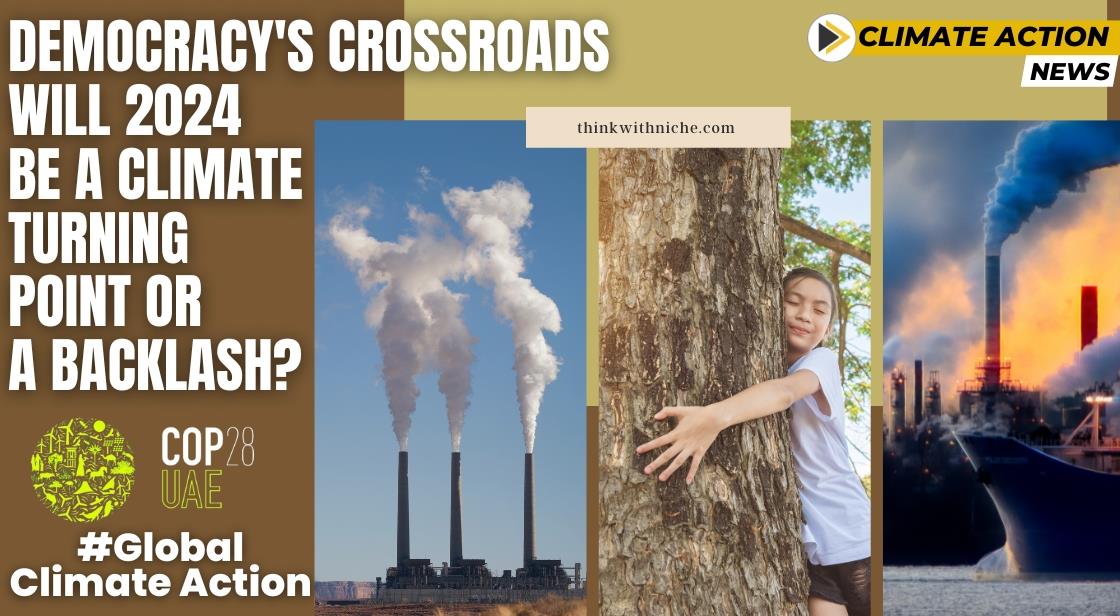Democracy's Crossroads: Will 2024 Be a Climate Turning Point or a Backlash?

News Synopsis
The conclusion of COP28 in Dubai marks a pivotal moment in environmental diplomacy, foretelling the collision between democratic processes and global climate agendas. As the spotlight turns towards political maneuvering, democracies worldwide brace for a year where climate concerns take center stage at the ballot box.
Where the Winds of Change May Blow (or Not): A Global Election Watch
-
India and Indonesia: Despite ambitious clean energy pledges, coal's deep roots in these powerhouses present formidable challenges. Elections are unlikely to shift the needle quickly, with incumbent leaders favored and opposition lacking clear climate agendas.
-
Mexico and South Africa: Hope flickers in these fossil fuel-reliant nations. In Mexico, climate scientist Claudia Sheinbaum's potential rise could usher in a shift, while South Africa's opposition promises a break from Eskom's coal stranglehold.
-
Authoritarian Clouds: Bangladesh, Pakistan, Russia, and Venezuela paint a stark picture. Incumbents wedded to polluting fuels and limited democratic space raise concerns about genuine climate progress in these nations.
-
Crouching Tigers, Hidden Opportunities: Taiwan's tight presidential race offers a nuanced landscape. While the opposition's stance on nuclear power could marginally reduce fossil fuel dependence, significant policy shifts remain uncertain. In South Korea, legislative elections are unlikely to break the climate gridlock.
-
Atlantic Turmoil: Europe's right-wing, climate-skeptical parties are gaining traction, threatening to impede progress. However, the left-right coalition in the European Parliament is likely to hold firm.
-
A Tale of Two Worlds: UK and US Hold the Mic
-
UK: Opposition leader Keir Starmer's strong poll numbers and "clean energy superpower" vision stand in stark contrast to Prime Minister Sunak's climate policy reversals. A change of guard could be a game-changer.
-
US: The November presidential election looms large. A second Trump term would spell disaster for global climate efforts, jeopardizing progress made under Biden's clean energy initiatives and straining the crucial US-China partnership.
-
The Climate Ballot:
Global Voter Influence:
In a significant electoral year, nations representing over 40% of the world's population and emissions will engage in polls. These elections hold the potential to either break impasses on climate policies or potentially fuel a backlash against climate initiatives.
Varied Prospects:
While some nations show promise in accelerating the shift to clean energy, others grapple with challenges. The upcoming polls are poised to redefine the landscape of climate policies across several key countries.
Political Landscape Review:
India and Indonesia:
Elections in these major democracies, although lacking indications of significant change, have recently displayed intent to embrace cleaner energy. Despite promising moves, coal's entrenched roots remain a challenge for reform.
Emerging Climate Leaders:
Mexico and South Africa show moderate potential for transitioning from fossil fuels. In Mexico, Claudia Sheinbaum's background as a climate scientist sparks hope for policy shifts. South Africa's impending polls may signal a departure from energy woes.
Polluting Authoritarians:
Bangladesh and Pakistan grapple with energy policies tied to imported natural gas amid disruptions, while nations like Russia and Venezuela face uncertain electoral processes that may not prompt substantive change.
Asian Dynamics:
In Taiwan, upcoming elections witness a close race with differing climate policies. South Korea faces political deadlock, hindering substantial climate-focused developments.
Developed Regions:
Europe confronts the rise of right-wing parties skeptical of climate action, while the UK charts a different course toward becoming a "clean energy superpower." The US election remains pivotal for climate action, with stark contrasts between Biden's vision and previous policies.
Conclusion:
While glimpses of progress in emissions reduction are evident, the elections of 2024 may not suffice to elevate climate policies, critical for steering the world towards net-zero goals. The clash of democracy and climate politics sets the stage for crucial decisions amid the pressing need for stronger political commitments.
You May Like









